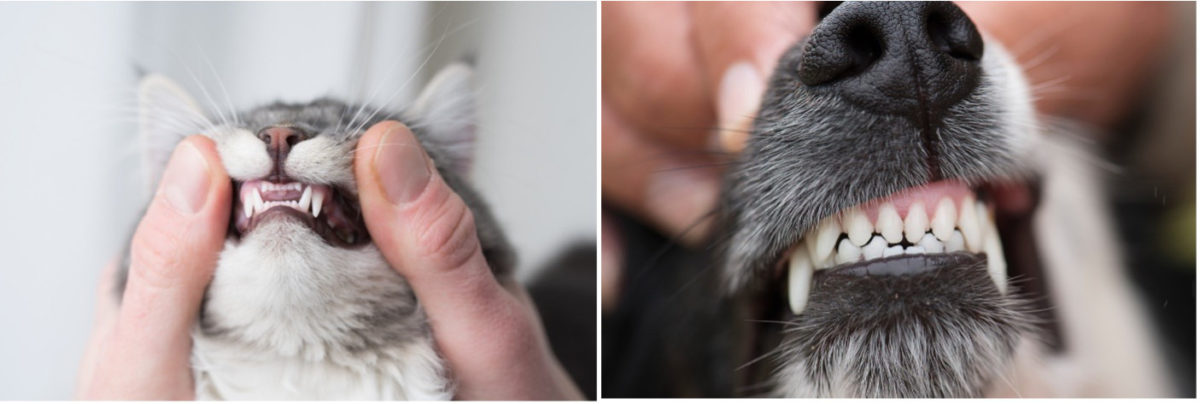Pet dental health is essential for your pet’s overall health and longevity. Although cavities are less common in pets than in people, they can have some of the same dental problems that people can develop.
Pet Dental Health Month
February is National Pet Dental Health Month. The AVMA created this month-long event to help raise awareness and promote the importance of pet dental health. Sometimes a problem is difficult to notice, and you find it when it’s too late, with your pet already in discomfort to the point where they have stopped eating.
Here at Cinema Veterinary, we will be celebrating your pet’s oral health by offering discounts on teeth cleaning in the month of February and March.
Why Pet Dental Health is Important
Proper dental care will help keep your pet from developing a wide variety of dental health issues, such as periodontal disease caused by bacteria buildup in the mouth. These bacteria form a film over the teeth called plaque. As the bacteria die, they can become calcified by the calcium in your pet’s saliva. The calcified plaque is called tartar, and it can eventually lead to gingivitis, which can lead to an infection in the root of the tooth. In the late stages of periodontal disease, the tissues around the tooth are destroyed, and the socket that holds the tooth in place erodes, causing a loose tooth.
Another common dental problem is broken teeth. Chewing on hard toys and treats like antlers and bones can damage your dog or cat’s teeth. A broken tooth can expose the tooth’s nerve, which is very painful for your pet. Additionally, the exposed nerve can become infected and cause even more problems for your pet. At this point, the tooth will need to be removed.
Veterinary research also suggests that periodontal disease in pets is linked with disorders of the organs too, particularly in the liver, kidneys, and heart.
Signs of Pet Dental Problems
Regardless of any problems, your pet’s teeth should be checked at least once a year by your veterinarian for early signs of a problem and to keep your pet’s mouth healthy.
Have your pet’s teeth checked sooner if you observe any of the following problems:
- Bad breath
- Broken or loose teeth
- Extra teeth or retained baby teeth
- Teeth that are discolored or covered in tartar
- Abnormal chewing, drooling or dropping food from the mouth
- Reduced appetite or refusal to eat
- Pain in or around the mouth
- Bleeding from the mouth
- Swelling in the areas surrounding the mouth
Some pets become irritable when they have dental problems, and any changes in your pet’s behavior should prompt a visit to your veterinarian. Be careful when checking your pet’s mouth because pain can cause a pet to react aggressively.
Exotic Pet Dental Care
Rabbits, Guinea pigs, hamsters, and chinchillas’ teeth grow continuously throughout their life. Their teeth need to be worn down and kept at the correct length/shape by eating their species-appropriate diet. Not eating the proper diet can result in severe dental disease and cause pain to your pet.
When you bring your exotic pet in for their yearly wellness exam, we will do a thorough check of their teeth to make sure they are healthy and not becoming overgrown. So, to keep your pet’s teeth and general health in top shape, you must bring your pet in for their wellness exams.
If you are unsure if you are feeding your pet correctly or concerned if they may have a dental problem, please give us a call. We are glad to help you with any questions about your pet.
Pet Dental Care at Home
In between bringing your animal to the veterinarian for dental care, you can do some things to help at home.
- Brush their teeth. Brushing your pet’s teeth may seem extreme, but it is hugely beneficial for them. We recommend you brush your pet’s teeth twice a day. As a note, never use your toothpaste on them.
There is toothpaste made for pets in different pet flavors such as poultry, seafood, and beef. There are also plaque prevention gels.
Note: brushing a dog or cat’s teeth is not the same as brushing your teeth. Here is an excellent video from the AVMA on brushing your pet’s teeth.
- Use tooth wipes. Tooth wipes are a faster and easier solution than brushing their teeth, although slightly less effective.
- Give them dental treats/chews. There are many treats and chew toys that you can buy for your pet that help remove plaque and improve dental health. If you are unsure what you should get for your pet, consult with your veterinarian.
We carry many dental products at our online store, where we deliver the products directly to your home. And you get free shipping if your purchase is $49 or more. If you are not sure which products are best for your pet, ask us, we’ll be glad to help.
Final Words
We recommend yearly wellness visits for all pets – even healthy ones! For senior pets (over the age of 7 years), we recommend bringing your pet every six months. At our wellness visits, or “Annual Exams,” Dr. Jaimie Ronchetto, Dr. Amber Wheelbarger, and Dr. Samantha Hancock may pick up on a concern early that might otherwise go undiagnosed or untreated. And because wellness exams include dental screening, that makes them even more essential. Preventative health care is the best way to give your pet a healthier, happier life!
Sincerely,
Jaimie Ronchetto, DVM
Cinema Veterinary Centre

